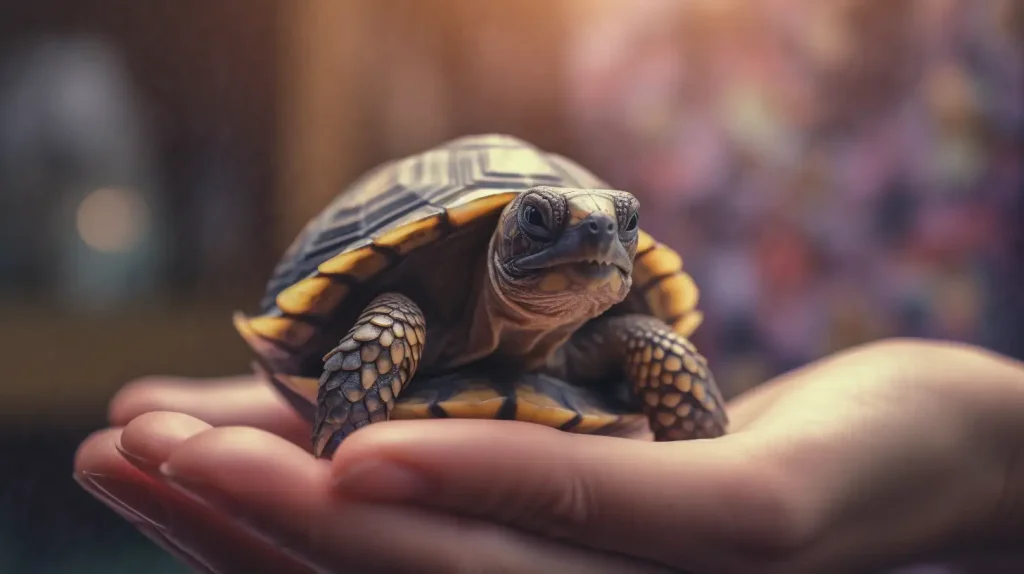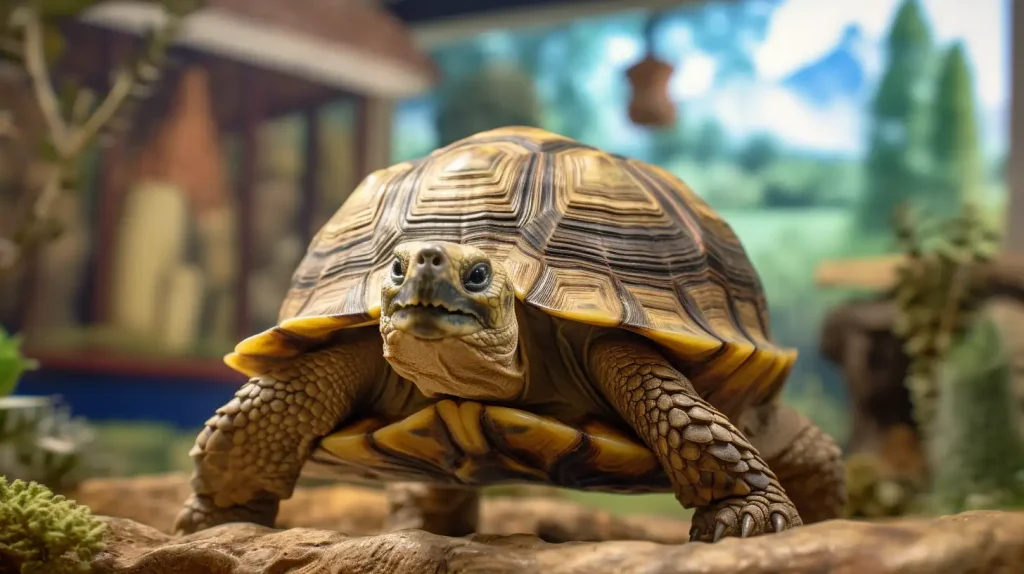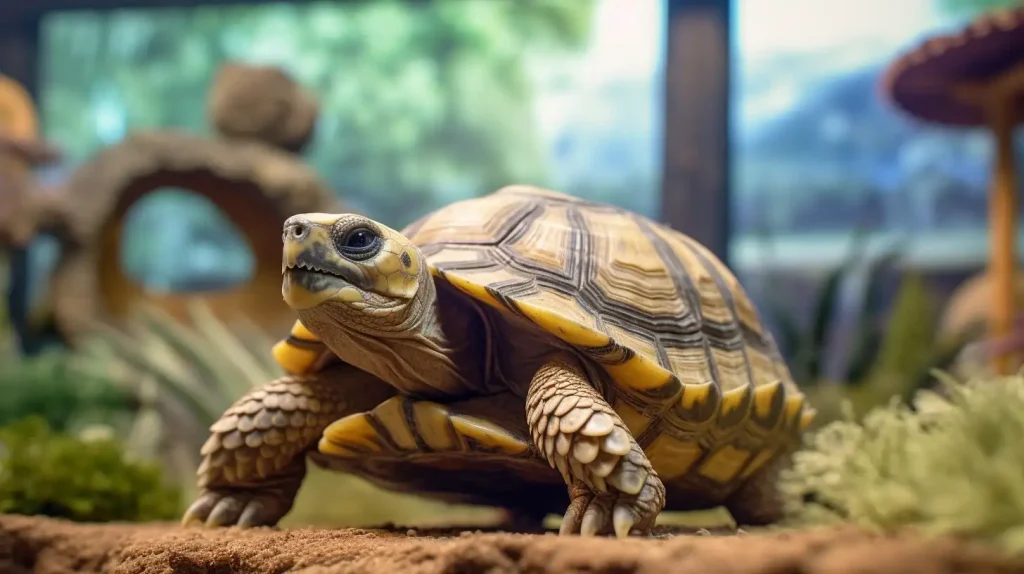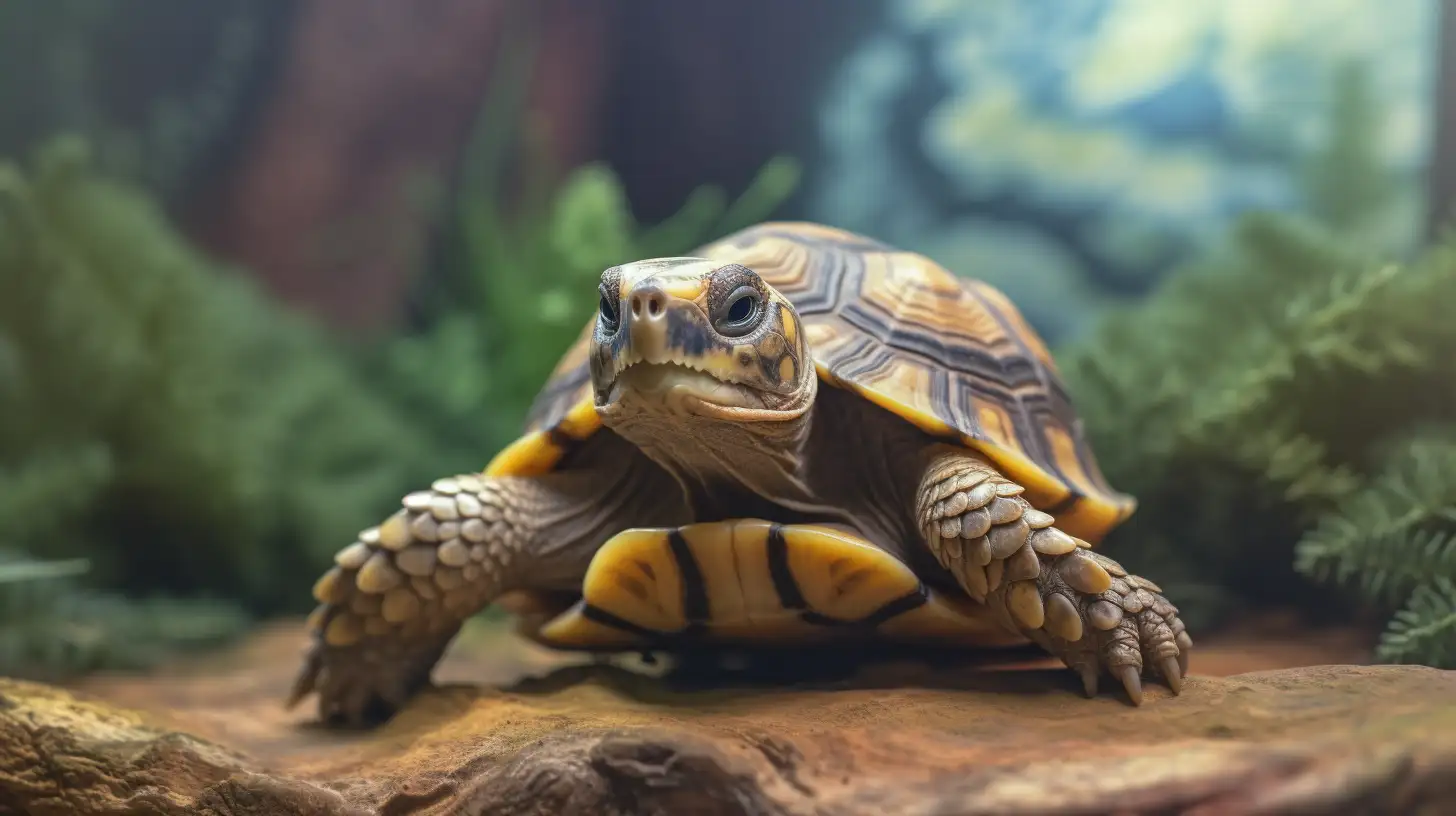Table of Contents
New or inexperienced tortoise owners frequently worry about the health of their pet based on the color of their poop. Some wonder why their tortoise’s poop is white and start to panic that there might be something wrong with the animal. There could be an assumption that this is to do with something they have eaten or that it is an illness of some kind.
The reality is that tortoise poop is not white, but urates (semi-solid waste substance) are. Urates are often passed at the same time as feces (which are typically brown/green). This can cause some new owners to panic, assuming that their pet has passed white poop.
Tortoise Waste Products
Tortoise waste typically contains three different types of fecal matter. Feces are mostly greenish/brown or brown but can be different shades depending on the type of food the animal has been eating. In addition to feces, tortoises also pass urine and urates. Urine is the liquid waste that is passed by the bladder. It contains toxins that have been filtered by the kidneys from the bloodstream.
also pass urine and urates. Urine is the liquid waste that is passed by the bladder. It contains toxins that have been filtered by the kidneys from the bloodstream.
Reptiles such as tortoises also pass another type of waste product, which is known as urates. Urates are semi-solid and a creamy white color and are typically passed at the same time as the liquid urine and the feces. This is the reason many people get confused about the color of their pet’s poop. It can become even more confusing when urine and urates are passed without feces as many owners assume that the urates are actually white poop.
Types of Food and Their Impact on Tortoise Poop
The diet of a tortoise plays a crucial role in determining the color and consistency of its waste. Feeding your tortoise a balanced and varied diet is not only important for its overall health, but it also directly influences what comes out the other end.
A tortoise’s diet generally consists of a mix of leafy greens, vegetables, and occasionally some fruits. When they are consuming a diet primarily made up of leafy greens, their feces will generally appear to be greenish-brown in color. However, when the diet includes more colorful veggies and fruits, don’t be surprised if you notice corresponding shades in your tortoise’s poop. For instance, the addition of beetroot in their diet can cause their poop to take on a reddish hue.
Dark Leafy Greens and Poop Consistency
Dark leafy greens are an important part of a tortoise’s diet, providing much-needed fiber. This fiber aids in digestion and helps to keep your tortoise’s poop well-formed and consistent. A diet lacking sufficient fiber may lead to softer, less formed feces, a possible sign of poor nutrition.
Hydration and its Impact on Tortoise Poop
A tortoise’s hydration level also directly influences the consistency of its waste. A well-hydrated tortoise, supplemented with moisture-rich foods like cucumbers and watermelons, will generally pass smoother and moister feces. On the other hand, a dehydrated tortoise may have drier, harder feces, often accompanied by lumpy urates, signaling a need for increased fluid intake.

Urate Formation in Tortoises
When it comes to tortoise biology, one of the intriguing processes is the formation of urates. You’ve likely seen the creamy, white substance accompanying the feces of your tortoise and might be wondering why it’s there and why it’s white. It’s all a part of how a tortoise’s body deals with waste; it’s actually quite fascinating.
To understand this process, you first need to know about nitrogen. As tortoises digest their food, they produce nitrogenous waste as a by-product. In mammals, including us humans, this waste is excreted as urea, which is soluble in water and thus easily flushed out through urine.
digest their food, they produce nitrogenous waste as a by-product. In mammals, including us humans, this waste is excreted as urea, which is soluble in water and thus easily flushed out through urine.
However, tortoises and other reptiles have a slightly different approach. Instead of producing urea, they form uric acid. This uric acid, together with various salts, results in a substance called urate, which is not water-soluble.
have a slightly different approach. Instead of producing urea, they form uric acid. This uric acid, together with various salts, results in a substance called urate, which is not water-soluble.
Now, you might be thinking, “Why would tortoises make things hard for themselves?” The answer lies in their evolutionary history. As creatures adapted to arid environments, conservation of water is critical for them. By excreting nitrogenous waste as urates, they can retain most of their water, a crucial survival strategy in habitats where water may be scarce. The white color of urates is simply due to the uric acid and associated salts contained within.
So, the next time you spot that white substance in your tortoise’s enclosure, you’ll know it’s just a testament to the amazing adaptation capabilities of these creatures. Still, it’s important to monitor the consistency of the urates, as changes could indicate potential health issues. Remember, balance is key to a happy and healthy tortoise.
Abnormal Poop
Knowing what your tortoise’s poop should look like can help you to quickly identify when your tortoise is having problems or is unwell. For example, if you notice that your tortoise’s poop is dry and the urates are lumpy, this will often indicate your pet is dehydrated. Other signs of dehydration are:
are:
- sunken eyes
- loss of appetite
- weight loss
- dry and flaky skin
- lethargy.
If you suspect dehydration, it is crucial to get fluids into your tortoise as quickly as possible. Do this by providing fresh, washed vegetation, a bowl of water, and also by soaking your tortoise. Tortoises can absorb water through their skin and cloaca. If you do soak your tortoise in water though, do make sure the water is no higher than the tortoise’s lower shell (the head should never, never be submerged).
Hydration and its Effect on Tortoise Poop
Just as with humans, the hydration levels in a tortoise significantly influence the nature of its excretions. Adequate hydration is essential for the healthy functioning of a tortoise’s digestive system, which in turn, is reflected in the consistency, color, and frequency of their poop.
In properly hydrated tortoises, feces are typically well-formed and of a consistent texture. They also tend to have a healthy greenish-brown or brown color, primarily influenced by the type of food the tortoise has been consuming. The white urates, a distinct aspect of reptile excretion, are usually creamy and semi-solid. However, these characteristics may change if the tortoise’s hydration level drops.
When a tortoise becomes dehydrated, its body naturally attempts to conserve as much water as possible. This physiological response directly impacts the composition and consistency of its poop and urates. Dehydrated tortoises tend to produce urates that are dry, chalky, and lumpy, rather than semi-solid and creamy. Their feces may also appear drier and harder than usual, and in some cases, may even resemble small pebbles.
Additionally, a dehydrated tortoise may excrete less frequently. As their bodies reabsorb more water from the waste in their digestive tracts, the feces become denser and more compact, leading to constipation or impaction in extreme cases. This can be an important sign for pet owners that their tortoise needs more water.
Given these effects, maintaining appropriate hydration in a tortoise is crucial, not just for the animal’s overall health, but also for ensuring a regular and healthy poop cycle. Fresh, washed vegetables and a clean water dish should always be readily available for your tortoise to help maintain their hydration levels. Regular soaking can also be beneficial, particularly for species originating from more humid habitats.
Parasitic Infection
Feces that are soft or runny is also an indication that something is amiss. It could be an issue with the food, but it could also be parasites causing a gut infection. If you notice watery or runny poop, you should ask a vet to examine the animal and to take a sample of poop, which can then be analyzed for parasites. If parasites are not the issue, it could be that something you are feeding your tortoise is causing an issue. Your vet will be able to advise you of any action to take in order to identify which foods are causing the problem.

Common Parasites in Tortoises
Tortoises, like many animals, are susceptible to a range of parasites that can impact their health and wellbeing. Identifying these parasites is important for maintaining your pet’s health, and one of the ways to do this is through observing changes in their poop.
Protozoans , specifically the genus Hexamita, are common parasites found in tortoises. These unicellular organisms typically reside in the gastrointestinal tract, leading to symptoms such as lethargy, loss of appetite, and dehydration. Tell-tale signs in a tortoise’s fecal matter can be its soft or runny consistency, sometimes with a noticeable foul smell. Moreover, a change in the normal color of poop, often turning it into a lighter shade, might suggest a protozoan infection.
, specifically the genus Hexamita, are common parasites found in tortoises. These unicellular organisms typically reside in the gastrointestinal tract, leading to symptoms such as lethargy, loss of appetite, and dehydration. Tell-tale signs in a tortoise’s fecal matter can be its soft or runny consistency, sometimes with a noticeable foul smell. Moreover, a change in the normal color of poop, often turning it into a lighter shade, might suggest a protozoan infection.
Another frequent culprit is intestinal worms or helminths, including roundworms and pinworms. These parasites can cause a variety of symptoms in tortoises, from weight loss and sluggishness to poor growth in younger tortoises. In terms of changes in feces, the presence of these worms might make the poop stringy or mucous-filled. In some cases, the worms might even be visible in the feces.
The Role of Parasites in Abnormal Poop
While it might seem a bit unpleasant, monitoring your tortoise’s poop can be an effective way to keep tabs on their health. If you notice that the color, consistency, or frequency of their poop changes, it’s worth considering a possible parasitic infection.
Remember, though, that many of these parasites are a normal part of a tortoise’s gut fauna and only become problematic when their numbers increase significantly. This imbalance often occurs when the tortoise’s immune system is weakened due to stress, poor diet, or unsuitable environmental conditions. So, changes in poop might also be a sign of underlying issues that are making your tortoise more susceptible to parasitic infections.
In any case, if you have concerns about your tortoise’s poop, it’s always wise to consult with a professional to help guide you in the right direction.
How Often Should Tortoises Poop?
How often you should expect to see poop from your tortoise is another question that is often asked. Unfortunately, there is no rhyme nor reason as to how often a tortoise will poop. So without any ‘normal’ pooping behaviors and habits to go by, it can be difficult to tell if there is an issue, especially when a lack of pooping can often be a sign of impaction.
As tortoises have a slow metabolism and digestive system, they do not usually poop every day. In fact, it is more common for them to poop every two to three days, but this can be even longer depending on what and how much they are eating. The longer you have your tortoise, the more you will get to know its pooping habits. This will then put you in a better position to understand if something is not right with your pet.
Something else to think about is the fact that tortoises have actually been known to eat their own poop! This means that your pet could be pooping and eating it before you see evidence of a bowel movement.
Why is My Tortoise Not Pooping?
If you are concerned about your tortoise not pooping, think about how much it is eating. The biggest indicator of a problem is not how much your tortoise poops but whether or not there are any changes in bowel habits.
For example, if your tortoise usually poops every couple of days but you have not seen any evidence of feces for a week or more, it might be time to consider that there is a problem. It could be that your pet is struggling with impaction and may need some assistance. You could try to give foods such as pure canned pumpkin, which acts as a natural laxative.
A warm soak is also recommended. Place your tortoise in warm water for twenty minutes every day to try to encourage a bowel movement. If this does not work, I recommend contacting your vet for advice. An x-ray may be needed to identify the problem.

Vets and Tortoise Health
When it comes to safeguarding the health and wellbeing of your tortoise, the role of a veterinarian can’t be overstated. Vets who specialize in reptiles, particularly tortoises, are equipped with the knowledge and experience to interpret the various signals your pet might be giving, including those hidden in the innocuous act of defecation.
As touched upon above, the composition, color, and consistency of tortoise poop can often serve as a reliable ‘health report card’. An experienced vet can analyze these physical attributes of the feces, coupled with other behavioral and physical signs, to diagnose potential health issues. For instance, the presence of parasites or unusual bacteria can often manifest as changes in the regularity or texture of the poop. Dehydration, a common health concern among tortoises, can lead to drier, lumpier urates, while certain gastrointestinal issues might result in softer or runnier feces.
The Importance of Regular Vet Check-ups
It’s important to note that regular vet visits are an essential part of tortoise care. These routine check-ups are about more than just poop analysis; they offer a chance for the vet to assess the overall health of your tortoise. Vets can monitor weight fluctuations, check for signs of disease or injury, and even offer dietary advice tailored to your tortoise’s specific needs.
Preventive Care and Early Diagnosis
Preventive care is a key aspect of these check-ups. With timely diagnosis and treatment, many health issues can be managed effectively, thereby ensuring a good quality of life for your tortoise. For example, a vet can identify early signs of shell disorders, respiratory problems, or metabolic bone disease – all common ailments in tortoises.
Tortoise Poop and Habitat Cleanliness
A spotless habitat is integral to the overall health and well-being of your tortoise. Let’s face it, nobody relishes the idea of cleaning poop, but in the world of tortoise care, it’s a task of paramount importance. Their unique metabolism and the nature of their waste, as you’ve come to understand, can pose certain challenges. Keeping a clean habitat doesn’t just make your tortoise’s home more visually pleasing; it also directly influences their physical health.
Regular and timely removal of tortoise poop prevents the buildup of harmful bacteria and parasites in the habitat. Parasites can infest tortoises through their feces and often result in health complications that can be difficult to handle, especially for new owners. When poop is allowed to accumulate, it can create a breeding ground for such parasites. Therefore, consistent cleanup ensures a healthier, safer environment for your tortoise.
The Practicality of Cleanliness
Of course, we’re all human, and cleaning can sometimes fall to the wayside in the hustle and bustle of daily life. One practical solution is creating a routine or schedule for poop cleanup. This routine can align with your tortoise’s digestive rhythms, making it easier to predict when cleanup will be necessary. Depending on your tortoise’s diet and individual habits, you might find that a certain time of day tends to be “poop o’clock.”
Another practical aspect of maintaining habitat cleanliness is the type of substrate you use in your tortoise’s enclosure. Some substrates are easier to clean and less likely to harbor bacteria and parasites. Consider speaking with a pet supply store or doing some online research to find out what options might be best for your particular species of tortoise.
Why is My Tortoise Poop White – Conclusion
In conclusion, understanding the ins and outs of your tortoise’s poop can be a crucial part of keeping them healthy and happy. Paying attention to their diet, hydration levels, and poop consistency can help you identify potential health issues early on and prevent complications down the line. Remember, regular vet check-ups, regular habitat cleanups, and a balanced diet are all key to ensuring your tortoise’s health and well-being. With this knowledge, you’ll be better equipped to care for your pet and appreciate the fascinating and unique biology of these amazing creatures.
Key Takeaways
- Tortoise poop is not actually white, but urates are, which are semi-solid waste substances.
- The color and consistency of a tortoise’s poop is affected by their diet.
- Parasites can impact a tortoise’s poop and overall health.
- Monitoring a tortoise’s poop can help identify possible health issues.
- It is common for tortoises to not poop every day and they can go two to three days or longer without pooping.
- Preventive care and early diagnosis are important for a tortoise’s health.
- A clean habitat is important for a tortoise’s overall health and well-being.
FAQs
Q: What does normal tortoise poop look like?
A: Normal tortoise poop typically consists of three components: feces, urine, and urates. The feces are usually brown or greenish, while urine is liquid and urates are semi-solid and white. The consistency can vary based on the tortoise’s diet.
Q: Why does my tortoise’s poop appear white?
A: The white substance in your tortoise’s poop is known as urates, a waste product passed along with feces. It’s common for tortoise owners to mistake these for white poop.
Q: Are urates harmful to my tortoise?
A: No, urates are a normal part of a tortoise’s excretion process and are not harmful. However, changes in their consistency may indicate health issues such as dehydration.
Q: How often should my tortoise poop?
A: Tortoises do not follow a set frequency for pooping. They usually poop every two to three days, but this can vary based on diet and individual digestive systems.
Q: What should I do if my tortoise is not pooping?
A: If you notice a significant change in your tortoise’s bowel habits, consult a vet. Impaction might be a cause, and certain foods or a warm soak may help stimulate bowel movement.
Q: How does diet influence the color and consistency of tortoise poop?
A: Different types of foods can affect the color and consistency of tortoise poop. For example, certain vegetables might result in greener feces.
Q: Is it a problem if my tortoise’s poop is soft or runny?
A: Soft or runny poop might indicate a problem such as gut infection or an issue with the food. In such cases, a vet should be consulted.
Q: Can the white poop be a sign of any disease?
A: Urates, the white part of tortoise poop, can indicate health issues if their consistency changes. Lumpy urates, for example, can be a sign of dehydration.
Q: What should I do if the urates in my tortoise’s poop look lumpy or hard?
A: Lumpy or hard urates often indicate dehydration. Provide your tortoise with fresh, washed vegetation and a bowl of water. Also, soaking your tortoise can help them absorb water.
Q: How do I distinguish between urine, feces, and urates in my tortoise’s waste?
A: Urine is typically liquid, feces are solid and brown or greenish, and urates are semi-solid and white.
Q: Why do tortoises eat their own poop?
A: While it might seem strange, tortoises have been known to eat their own poop, possibly as a means to recycle nutrients.
Q: Can parasites affect my tortoise’s poop?
A: Yes, parasites can cause changes in the consistency of your tortoise’s feces. Runny or watery poop could be a sign of a parasitic infection.
Q: How important is habitat cleanliness in relation to my tortoise’s poop?
A: Maintaining a clean habitat is vital for your tortoise’s health. Prompt poop removal prevents the buildup of harmful bacteria and parasites.
Q: Is it necessary to take my tortoise to a vet if I notice a change in their poop?
A: Yes, significant changes in your tortoise’s poop can indicate health issues. It’s always best to consult a vet in these cases to identify and address potential problems.
COPYRIGHT NOTICE
Please be advised that all images, designs, and creative content on this page are the exclusive property of JustExoticPets.com and are protected under international copyright laws. The images may not be reproduced, copied, transmitted or manipulated without the written permission of JustExoticPets.com.
and are protected under international copyright laws. The images may not be reproduced, copied, transmitted or manipulated without the written permission of JustExoticPets.com.
Unauthorized use, distribution, display, or creation of derivative works of any images contained on this site, is strictly prohibited and can lead to legal penalties. We actively monitor for, and enforce, our copyright interests.
If you wish to use any of our images, kindly contact us to seek permission. Respect of copyright is not merely a legal requirement but also an acknowledgement and support of the hard work and creativity that goes into producing them.
Thank you for your understanding and cooperation.
© 2023, JustExoticPets.com. All Rights Reserved.

